-
01-01-2016
Nurses’ managerial knowledge in the hospital setting
Revista Brasileira de Enfermagem. 2016;69(4):676-683
Abstract
Nurses’ managerial knowledge in the hospital setting
Revista Brasileira de Enfermagem. 2016;69(4):676-683
DOI 10.1590/0034-7167.2016690409i
Views0See moreABSTRACT
Objective:
to analyze nurses’ managerial skills in the hospital setting, their perception of their own education and the relevance of training for their professional practice.
Method:
qualitative study based on the dialectical hermeneutics framework. Thirty-two nurses from three hospitals in the Brazilian state of Minas Gerais contributed to the study by taking part in six focus groups. Records were transcribed and three categories emerged from content analysis.
Results:
results evidenced the following managerial skills: supervision, leadership, decision making, planning and organization, as well as the relevance of education centers for their improvement and the continuing development of the nurses’ managerial skills.
Conclusion:
the authors believe this investigation will contribute for the improvement of nurses’ necessary managerial skills and also to identify gaps in this area of their education.
-
01-01-2016
Analysis of obstetric care provided by the Mobile Emergency Care Service
Revista Brasileira de Enfermagem. 2016;69(4):669-675
Abstract
Analysis of obstetric care provided by the Mobile Emergency Care Service
Revista Brasileira de Enfermagem. 2016;69(4):669-675
DOI 10.1590/0034-7167.2016690408i
Views1See moreABSTRACT
Objective:
analyze the pertinence of calls made by obstetric users of the Mobile Emergency Care Service (SAMU 192) of Botucatu-SP.
Method:
retrospective and analytical research. All records of prehospital obstetric care delivered by the SAMU 192 in 2012 were analyzed. To be considered responsive, calls should lead to referral to a reference obstetric hospital or be classified with the colors red, orange and yellow, according to risk criteria defined by the Ministry of Health.
Results:
considering the two outcomes evaluated: referral to a reference hospital and risk criteria defined by the Ministry of Health, 6.7% and 75.6% of the calls were not pertinent, respectively. There was no matching between outcomes, neither variation between primiparas and multiparas as regards the call pertinence.
Conclusion:
this study ratifies the need for implementing a risk classification protocol in obstetrics, and support managers in the organization, qualification and effective implementation of the Rede Cegonha.
-
01-01-2016
Experiences with severe maternal morbidity: a qualitative study on the perception of women
Revista Brasileira de Enfermagem. 2016;69(4):662-668
Abstract
Experiences with severe maternal morbidity: a qualitative study on the perception of women
Revista Brasileira de Enfermagem. 2016;69(4):662-668
DOI 10.1590/0034-7167.2016690407i
Views0See moreABSTRACT
Objective:
to know and analyze the experiences of women who developed an episode of Severe Maternal Morbidity.
Method:
this is a qualitative study, in which we interviewed 16 women admitted to a tertiary level hospital, as a result of this morbid state. We used content analysis in data processing.
Results:
two categories were identified: “Understanding maternal morbidity as a negative presence” and “Moving ahead: on constant alert”. The interviewees mentioned negative aspects, such as treatment difficulties and hospitalization, feelings of fear, concern for the fetus, frustration with the idealized pregnancy, trauma; and positive aspects, such as learning and the expression of the divine will in the experience of illness.
Conclusion:
effective care during the prenatal period, delivery and postpartum period should provide adequate support for the prevention and assistance in Severe Maternal Morbidity.
-
01-01-2016
Dialogue: network that intertwines the pedagogical relationship into the practical-reflective teaching
Revista Brasileira de Enfermagem. 2016;69(4):654-661
Abstract
Dialogue: network that intertwines the pedagogical relationship into the practical-reflective teaching
Revista Brasileira de Enfermagem. 2016;69(4):654-661
DOI 10.1590/0034-7167.2016690406i
Views0See moreABSTRACT
Objective:
to understand how dialogue occurs in the pedagogical relation in the practical reflective teaching in an undergraduate program in nursing.
Method:
qualitative research, case study. Data collection was conducted from May 2013 to September 2014 with eight professors of Nursing, by means of observation and interviews. Data analysis followed the operational proposal constituted by the exploratory stage and the interpretive stage.
Results:
point the dialogue established within the pedagogical relation as a challenge to be faced in practical-reflective teaching, so professor and student build a relationship that foster thought and action in the theoretical context and in the field of practice.
Conclusion:
in establishing a dialogic-reflective tone in the pedagogical relationship, the professor opens paths to new discoveries, enabling the creation of teaching-learning spaces that stimulate autonomy, abilities, and critical and reflective attitudes of students along their education.
-
01-01-2016
Nursing care through the perception of hospitalized children
Revista Brasileira de Enfermagem. 2016;69(4):646-653
Abstract
Nursing care through the perception of hospitalized children
Revista Brasileira de Enfermagem. 2016;69(4):646-653
DOI 10.1590/0034-7167.2016690405i
Views0See moreABSTRACT
Objective:
to describe the perception of hospitalized children of school age, on nursing care and understand what are, from their perspective, the best ways to address it to when performing such care.
Method:
qualitative, descriptive, exploratory research, with concepts of Vygotsky used as theoretical framework. The data collection occurred through interviews mediated by drawings and was performed with ten school children, with the interview later transcribed and submitted to a thematic analysis.
Results:
showed the importance of playing during hospitalization, of a friendly and caring approach and providing explanations regarding the performed procedures.
Conclusion:
nursing professionals need to consider how the children would like to receive the care being provided, so that their singularities are respected, characterizing nursing actions according to a perspective of the whole human being.
-
01-01-2016
Cost of dressings for prevention of sacral pressure ulcers
Revista Brasileira de Enfermagem. 2016;69(4):641-645
Abstract
Cost of dressings for prevention of sacral pressure ulcers
Revista Brasileira de Enfermagem. 2016;69(4):641-645
DOI 10.1590/0034-7167.2016690404i
Views0See moreABSTRACT
Objective:
to identify costs of dressings to prevent sacral pressure ulcers in an adult intensive care unit in Paraná, Brazil.
Methods:
secondary analysis study with 25 patients admitted between October 2013 and March 2014, using transparent polyurethane film (n=15) or hydrocolloid dressing (n=10) on the sacral region. The cost of each intervention was based on the unit amount used in each type of dressing, and its purchase price (transparent film = R$15.80, hydrocolloid dressing = R$68.00).
Results:
the mean cost/patient was R$23.17 for use of transparent film and R$190.40 for use of hydrocolloid dressing. The main reason for changing the dressing was detachment.
Conclusion:
the transparent film was the most economically advantageous alternative to prevent sacral pressure ulcers in critical care patients. However, additional studies should be carried out including assessment of the effectiveness of both dressings.
-
01-01-2016
Health practices: the view of the black elderly population in a terreiro community
Revista Brasileira de Enfermagem. 2016;69(4):633-640
Abstract
Health practices: the view of the black elderly population in a terreiro community
Revista Brasileira de Enfermagem. 2016;69(4):633-640
DOI 10.1590/0034-7167.2016690403i
Views1See moreABSTRACT
Objective:
to understand health practices of black, elderly people in a terreiro community (community of followers of traditional African-Brazilian religions).
Method:
qualitative descriptive study under the Black-African paradigm of civilization constituted by the Black-African cultural complex and the structuring elements of the African cosmovision. Semi-structured interviews were carried out from July to September 2013, with six black older people from a terreiro community in Porto Alegre, RS.
Results:
thematic content analysis resulted in the following categories: Ancestry; Belonging: the way to know and practice health; Health knowledge and practices in terreiro communities; and Complementarity: promoting health in the terreiro and traditional medicine and its respective subcategories.
Conclusion:
the study understood the importance of having a knowledge of the practices of African traditions in both the lifestyle and health of the older black population to help with nursing planning and interventions in response to their needs.
-
01-01-2016
Social representations of citizenship by inpatients: implications for hospital care
Revista Brasileira de Enfermagem. 2016;69(4):625-632
Abstract
Social representations of citizenship by inpatients: implications for hospital care
Revista Brasileira de Enfermagem. 2016;69(4):625-632
DOI 10.1590/0034-7167.2016690402i
Views0See moreABSTRACT
Objective:
examine the social representations of citizenship by inpatients receiving hospital care.
Method:
qualitative approach, using the Theory of Social Representations as a framework, with 31 inpatients in the internal medicine sector of a public university hospital. Semi-structured interviews were conducted, whose data were submitted to the Alceste program, with application of lexical analysis.
Results:
patients understand their rights, and citizenship in the care process is understood based on the right to health, to receive good care from a technical and human standpoint.
Conclusion:
being well treated as a person and the provision of technical-procedural care are rights of patients; the absence of one or the other implies, therefore, lack of respect for their citizenship.

-
ORIGINAL ARTICLE06-14-2021
Continuity of neuro-psychomotor stimulation of children with congenital Zika syndrome
Revista Brasileira de Enfermagem. 2021;74(6):e20200694
Abstract
ORIGINAL ARTICLEContinuity of neuro-psychomotor stimulation of children with congenital Zika syndrome
Revista Brasileira de Enfermagem. 2021;74(6):e20200694
DOI 10.1590/0034-7167-2020-0694
Views0See moreABSTRACT
Objective:
Understand the continuity of stimulation of neuro-psychomotor development in children with congenital Zika syndrome.
Method:
Descriptive-exploratory study with theoretical support in symbolic interactionism. Between August and November 2019, 12 health professionals were interviewed in depth; and to the focus group, seven caregivers of children with the syndrome. The analysis was thematic inductive.
Results:
The continuation of neuro-psychomotor stimulation of children with Zika syndrome goes through: organizational difficulties (lack of doctors, professional unpreparedness, dissatisfaction and search for other services); socioenvironmental aspects (low maternal education, low socioeconomic level, difficulty in moving and lack of support); and conditions inherent to children (hospitalizations for respiratory crises, seizures, hypoactivity and social stigma).
Final considerations:
A strengthened support network with qualified human resources is necessary in order to provide comprehensive care and avoid the discontinuity of neuro-psychomotor stimulation of children with congenital Zika syndrome.
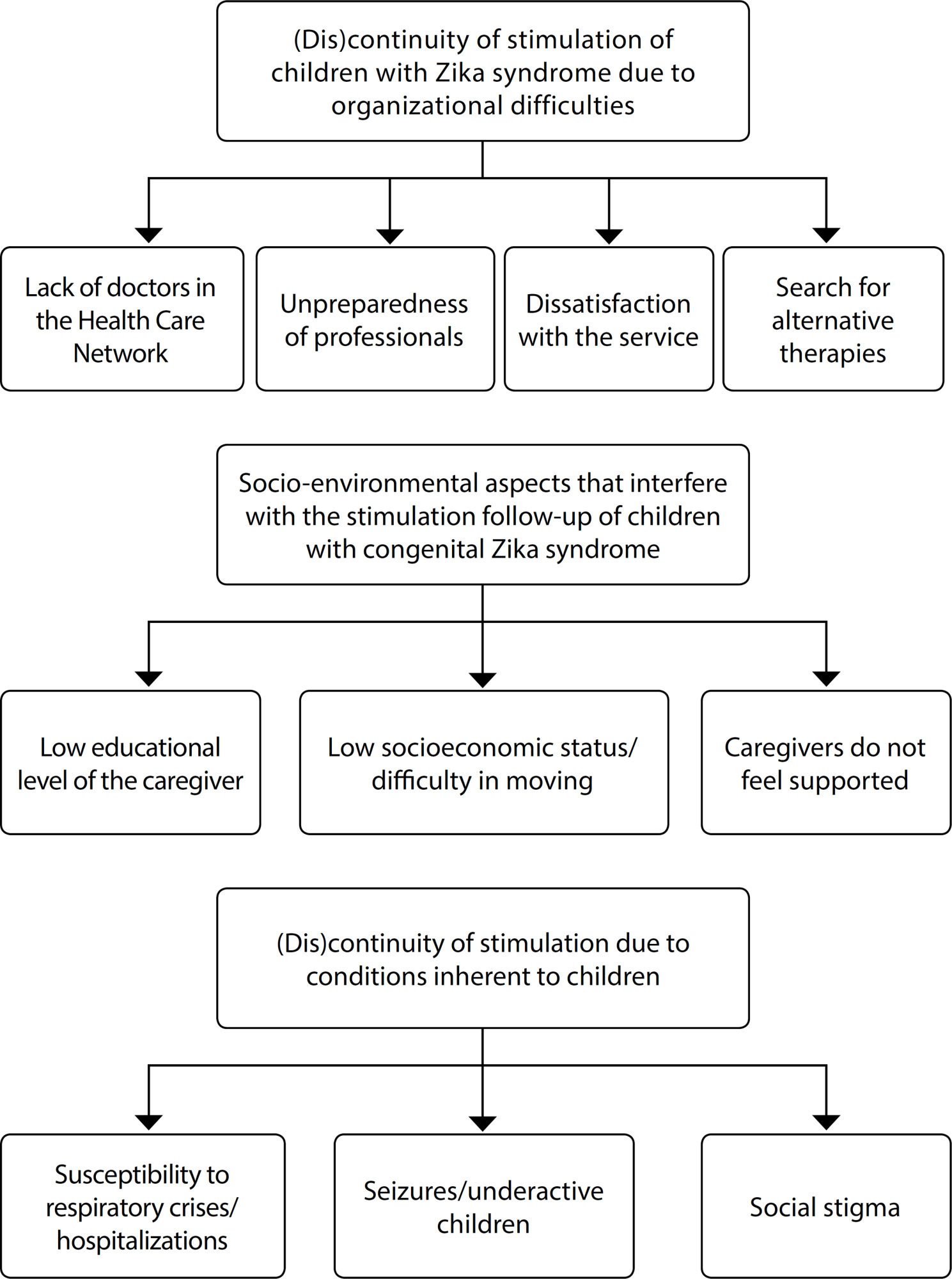
-
ORIGINAL ARTICLE08-20-2021
Risk of suicide among nursing students
Revista Brasileira de Enfermagem. 2021;74(6):e20200867
Abstract
ORIGINAL ARTICLERisk of suicide among nursing students
Revista Brasileira de Enfermagem. 2021;74(6):e20200867
DOI 10.1590/0034-7167-2020-0867
Views0See moreABSTRACT
Objectives:
to identify the risk and degree of risk of suicide in nursing students of a public institution in the countryside of Pernambuco, Brazil.
Methods:
this was a cross-sectional, quantitative research conducted with 150 students. For data collection, a sociodemographic questionnaire and the instrument, M.I.N.I. – Brazilian version 5.0.0 – Module C – Risk of suicide were used. Statistical analyses were performed with IBM(® )SPSS(®), version 23.
Results:
53.3% of nursing students had a risk of suicide, of which 20.7% had a high risk. Moreover, 22.67% reported previous suicide attempt. It is noteworthy that students without a partner have a higher risk of suicide (56.8%) than those with a partner (29.4%).
Conclusions:
it is perceived the need to develop programs that identify students at risk of suicide in higher education institutions, in order to raise awareness of the problem and implement policies to promote mental health in the academia.
-
REVIEW08-20-2021
Root Cause Analysis, Failures and Effects in pediatric total quality management: a scoping review
Revista Brasileira de Enfermagem. 2021;74(6):e20200954
Abstract
REVIEWRoot Cause Analysis, Failures and Effects in pediatric total quality management: a scoping review
Revista Brasileira de Enfermagem. 2021;74(6):e20200954
DOI 10.1590/0034-7167-2020-0954
Views0See moreABSTRACT
Objectives:
to analyze the applicability of Root Cause Analysis and Failure Mode and Effect Analysis tools, aiming to improve care in pediatric units.
Methods:
this is a scoping review carried out according to the Joanna Briggs Institute guidelines, following the Preferred Reporting Items for Systematic Reviews and Meta-Analyzes extension for Scoping Reviews. Search took place in May 2018 on 15 data sources.
Results:
search totaled 8,254 studies. After using the relevant inclusion and exclusion criteria, 15 articles were included in the review. Of these, nine were published between 2013 and 2018, 12 used Failure Mode and Effect Analysis and 11 carried out interventions to improve the quality of the processes addressed, showing good post-intervention results.
Final Considerations:
the application of the tools indicated significant changes and improvements in the services that implemented them, proving to be satisfactory for detecting opportunities for improvement, employing specific methodologies for harm reduction in pediatrics.
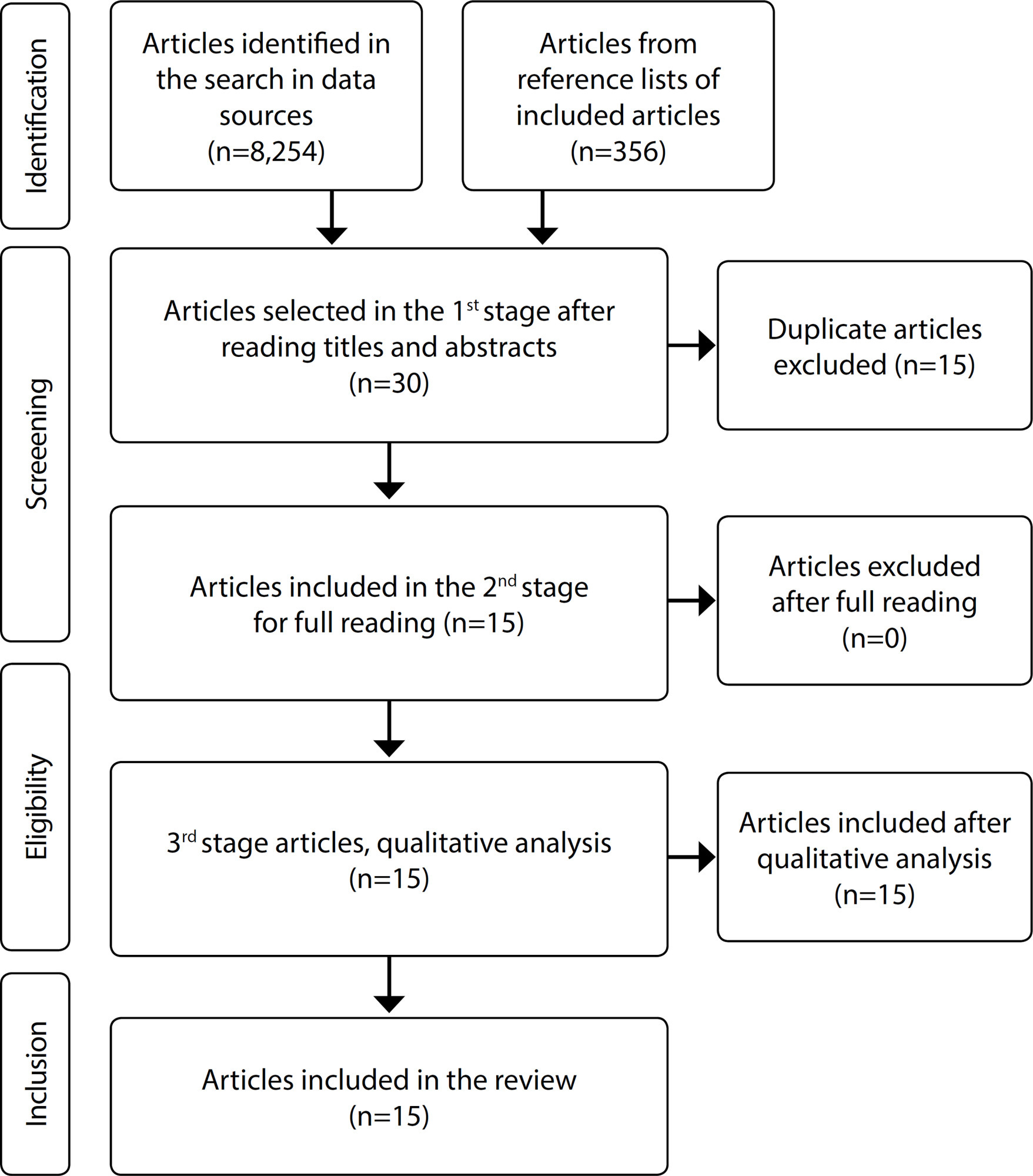
-
ORIGINAL ARTICLE07-26-2021
Representations about sexuality of people diagnosed late with HIV infection
Revista Brasileira de Enfermagem. 2021;74(6):e20201028
Abstract
ORIGINAL ARTICLERepresentations about sexuality of people diagnosed late with HIV infection
Revista Brasileira de Enfermagem. 2021;74(6):e20201028
DOI 10.1590/0034-7167-2020-1028
Views0See moreABSTRACT
Objective:
to understand the representations about sexuality of people diagnosed late with HIV infection and its implications in the delayed search for diagnosis.
Methods:
this is a qualitative study, whose theoretical and methodological framework was Social Representation Theory. The research was carried out with 18 people diagnosed late with HIV infection through an open interview. For data analysis, Structural Narration Analysis was used, with support from MAXQDA 12®.
Results:
representations about sexuality contributed to delayed diagnosis, such as trust in a fixed partnership, sexual intercourse is natural, sexuality as a taboo, search for pleasure in sexual intercourse, regardless of risks, denial of risk for HIV infection.
Final considerations:
representations about sexuality participate in a web of stereotypes and riskier ways of living, which contribute to delayed diagnosis. Sexual health education remains necessary and essential throughout people’s lives.
-
08-20-2021
Prevalence of central venous catheter salvage in newborn with staphylococcal bloodstream infection
Revista Brasileira de Enfermagem. 2021;74(6):e20201073
Abstract
Prevalence of central venous catheter salvage in newborn with staphylococcal bloodstream infection
Revista Brasileira de Enfermagem. 2021;74(6):e20201073
DOI 10.1590/0034-7167-2020-1073
Views0See moreABSTRACT
Objectives:
to establish the prevalence of salvage of central venous catheters in newborns with bloodstream infection caused by coagulase-negative staphylococci.
Methods:
retrospective cross-sectional study with 136 newborns admitted to the Neonatal Intensive Care Unit between 2011 and 2017. The total of 143 infection events undergoing antibiotic therapy were evaluated.
Results:
among the 143 infection events, 39 catheters in which antibiotic therapy was used were saved and in 69 cases, the device was removed. Positive central blood culture and single lumen catheter were factors associated with salvage failure. The probability of salvage decreased with infections diagnosed from 15 days of using the catheter. Negative blood culture raised the chance of salvage by fourfold.
Conclusions:
the use of antibiotic therapy in the treatment of infections resulted in a low prevalence of salvage of the central venous catheter. The probability of salvage was associated with variables of the device.
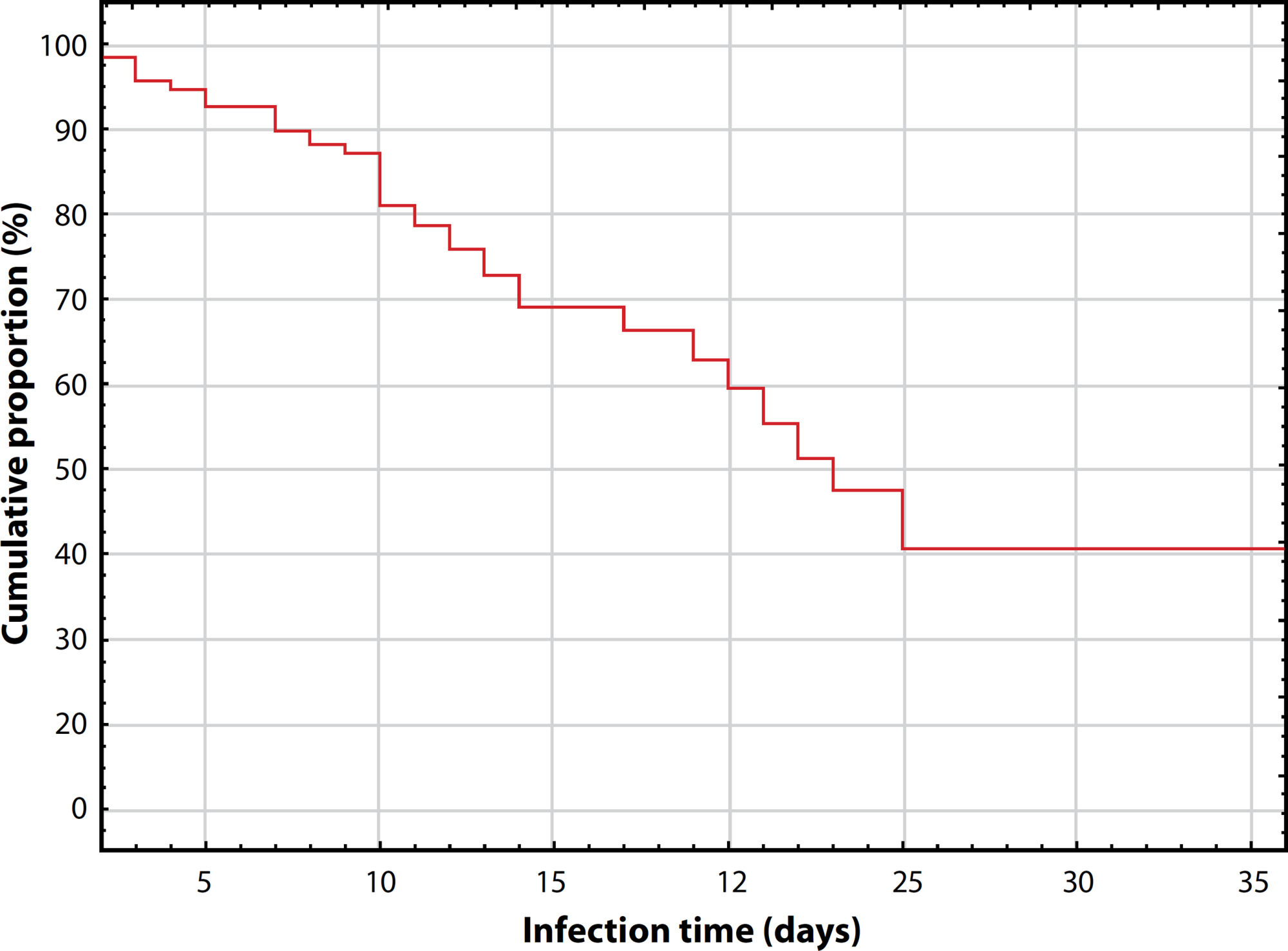
-
EXPERIENCE REPORT02-15-2021
Coronavirus infections: health care planning based on Orem’s Nursing Theory
Revista Brasileira de Enfermagem. 2021;74:e20200281
Abstract
EXPERIENCE REPORTCoronavirus infections: health care planning based on Orem’s Nursing Theory
Revista Brasileira de Enfermagem. 2021;74:e20200281
DOI 10.1590/0034-7167-2020-0281
Views0See moreABSTRACT
Objective:
to report the experience of professors and students of a graduate course on nursing care in coping with the new coronavirus (COVID-19) based on Self-Care Theory.
Method:
the active methodologies used were a literature search and seminar presentations, with an understanding of Orem’s theoretical concepts: health; man; self-care; universal, developmental and health deviation requirements; self-care activities; self-care deficits; the required therapeutic demand; nursing systems. The pandemic was considered a health deviation that requires critical thinking and nursing care planning. Methodological frameworks to classify nursing diagnoses, interventions, and outcomes were used.
Results:
for each health deviation, nursing systems were identified; self-care deficits, diagnoses; actions, interventions; and the form of assessment, outcomes.
Final considerations:
theoretical-practical reflections of the academic context support nursing care planning.
-
REFLECTION03-05-2021
Reflections on patient safety incident reporting systems
Revista Brasileira de Enfermagem. 2021;74:e20200307
Abstract
REFLECTIONReflections on patient safety incident reporting systems
Revista Brasileira de Enfermagem. 2021;74:e20200307
DOI 10.1590/0034-7167-2020-0307
Views0See moreABSTRACT
Objective:
To reflect on the main characteristics and recommendations of Incident Reporting Systems, discuss the population’s participation in reporting, and point out challenges in the Brazilian system.
Method:
Reflection study, based on Ordinance No. 529/13, which instituted the National Patient Safety Program, under Collegiate Board Resolution (CBR) No. 36/13; reflections by experts were added.
Results:
Reporting systems are a source for learning and monitoring, allow early detection of incidents, investigations and, mainly, the generation of recommendations prior to recurrences, in addition to raising information for patients and relatives. There is little participation of the population in the reporting, regardless of the type of system and characteristics such as confidentiality, anonymity, and mandatory nature.
Final Considerations:
In Brazil, although reporting is mandatory, there is an urgency to advance the involvement and participation of the population, professionals, and institutions. To simplify data entry by improving the interface and importing data from the reporting system is an objective to be achieved.
-
EXPERIENCE REPORT01-29-2021
Restructuring service at a mastology outpatient clinic during the COVID-19 pandemic
Revista Brasileira de Enfermagem. 2021;74:e20200571
Abstract
EXPERIENCE REPORTRestructuring service at a mastology outpatient clinic during the COVID-19 pandemic
Revista Brasileira de Enfermagem. 2021;74:e20200571
DOI 10.1590/0034-7167-2020-0571
Views0INTRODUCTIONCOVID-19 is a disease caused by the SARS-CoV-2 coronavirus (Severe Acute Respiratory Syndrome Coronavirus 2) and has brought a threat to public health worldwide. In need of immediate changes, adaptations tend to be the way out to avoid contamination that potentially does not distinguish race, color, gender().The global numbers of suspected and confirmed cases are […]See more
-
REVIEW12-05-2019
Financial-patrimonial elder abuse: an integrative review
Revista Brasileira de Enfermagem. 2019;72:328-336
Abstract
REVIEWFinancial-patrimonial elder abuse: an integrative review
Revista Brasileira de Enfermagem. 2019;72:328-336
DOI 10.1590/0034-7167-2018-0703
Views0See moreABSTRACT
Objective:
to analyze the available evidence in the nursing literature about financial-patrimonial elder abuse.
Method:
integrative review of articles indexed in the databases CINAHL, Scopus, Web of Science, LILACS and MEDLINE, from 2007 to 2017. The combination of controlled and uncontrolled descriptors was used in Portuguese, English and Spanish.
Results:
15 studies developed in seven countries were included. In the thematic analysis, three categories emerged: epidemiological data, risk factors and institutions providing services to the elderly. The occurrence of this type of violence concomitantly to the other subtypes was highlighted among the most frequent.
Final considerations:
the literature points to important epidemiological data, risk factors and characteristics of this type of violence, including within institutions providing services to the elderly, in different countries, essential aspects for structuring and rethinking public policies for protection and appreciation of the elderly.
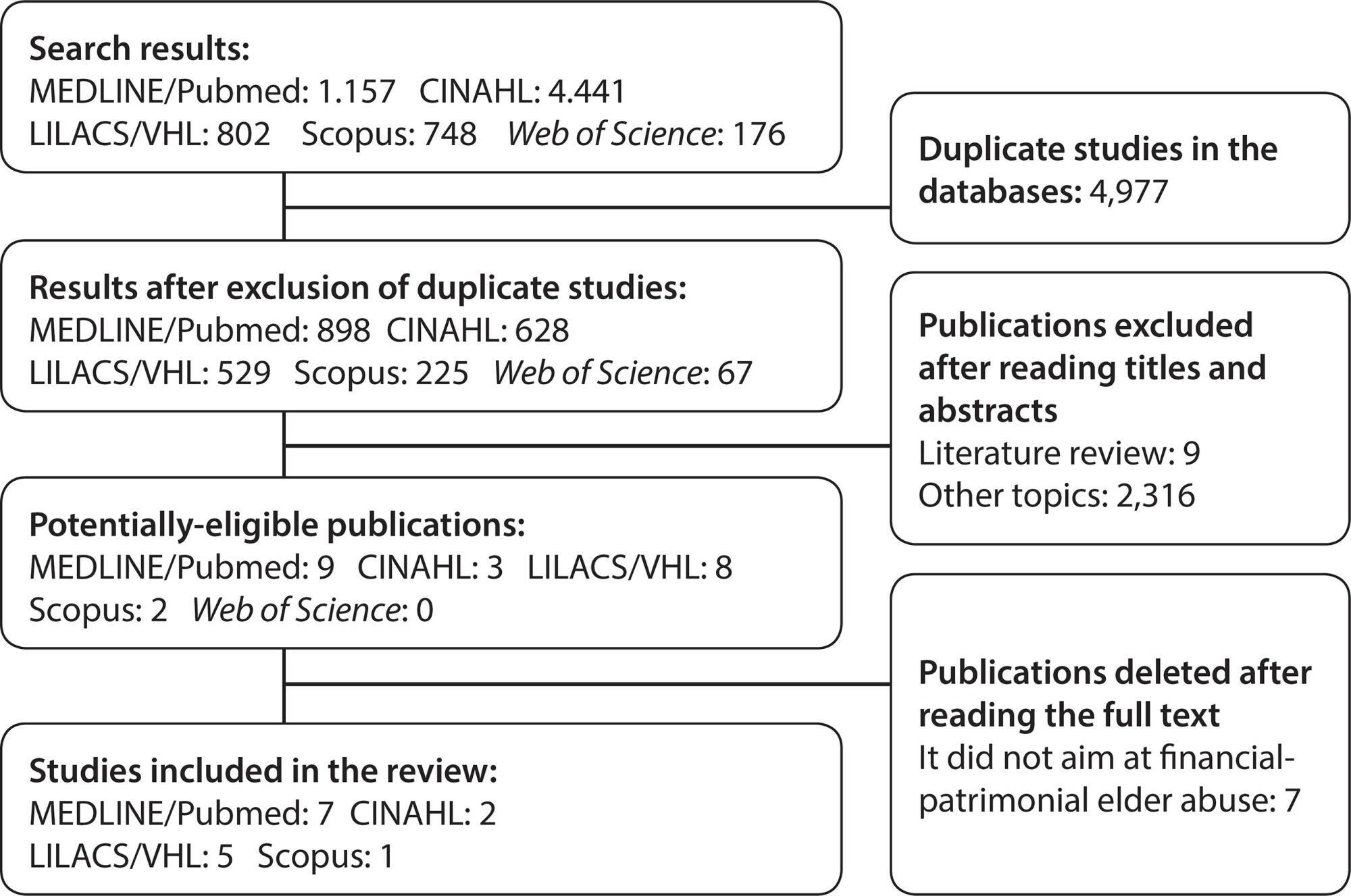
-
ORIGINAL ARTICLE07-06-2020
Vulnerability in the health of young transgender women living with HIV/AIDS
Revista Brasileira de Enfermagem. 2020;73(5):e20190046
Abstract
ORIGINAL ARTICLEVulnerability in the health of young transgender women living with HIV/AIDS
Revista Brasileira de Enfermagem. 2020;73(5):e20190046
DOI 10.1590/0034-7167-2019-0046
Views0See moreABSTRACT
Objectives:
to analyze the health vulnerability of young female transgender living with HIV/AIDS.
Methods:
qualitative, descriptive, and exploratory study, based on the theoretical reference of Social Representation and concept of vulnerability; developed with six transgender women in a reference Hospital for HIV/AIDS. We analyzed the individual interviews, recorded, and transcribed in full, in the IRaMuTeQ software by Similitude Analysis.
Results:
the thematic categories are listed based on the Ayres reference: 1) Individual dimension of vulnerability to HIV/AIDS; 2) Social dimension of vulnerability to HIV/AIDS; 3) Programmatic dimension of the vulnerability.
Final Considerations:
the young female transsexual living with HIV/AIDS experience a context of vulnerability in health associated with a lack of knowledge and difficulties for the realization of self-care. The study evidenced the representations of social abjection and unpreparedness of the health team that compose the Primary Attention in Health in promoting qualified assistance for the execution of the effective and humanized care.
-
12-13-2019
Women’s health during pregnancy, childbirth and puerperium: 25 years of recommendations from international organizations
Revista Brasileira de Enfermagem. 2019;72:1-2
Abstract
Women’s health during pregnancy, childbirth and puerperium: 25 years of recommendations from international organizations
Revista Brasileira de Enfermagem. 2019;72:1-2
DOI 10.1590/0034-7167-2019-72suppl301
Views1Women’s health during pregnancy, childbirth and the puerperium has been a concern of international bodies since the 1994 United Nations International Conference on Population and Development in Cairo, Egypt. This conference had as theme Women’s Health and Safe Motherhood. The rationale for choosing the theme was that pregnancy and childbirth-related complications were among the leading […]See more -
ORIGINAL ARTICLE04-22-2020
(Dis)continuation of care of the pre-term newborn at the border
Revista Brasileira de Enfermagem. 2020;73(3):e20180827
Abstract
ORIGINAL ARTICLE(Dis)continuation of care of the pre-term newborn at the border
Revista Brasileira de Enfermagem. 2020;73(3):e20180827
DOI 10.1590/0034-7167-2018-0827
Views0See moreABSTRACT
Objectives:
to understand how continuation of care for the preterm newborn in the health care network at the border.
Methods:
the Grounded Theory was the methodological framework. Data were collected through 17 semi-structured interviews between July 2016 and March 2017.
Results:
“Describing the structure and functioning of the Child Nutrition Center” represents the context; “Experiencing and signifying premature birth” are the causal conditions; “Identifying conditions that intervene in the process of continuation of care for the preterm newborn” are the intervening conditions; “Ensuring continuation of care for the preterm newborn” are strategies; “Identifying (dis)continuation of care flows for the preterm newborn at the border” are the study’s consequences and phenomenon.
Final Considerations:
there is a need to plan referral and counter-referral flows of the preterm newborn and the commitment of public health managers to ensure continuation of care.
-
ORIGINAL ARTICLE05-09-2022
Wise Infant Development®: creation of a software for teaching in pediatric nursing education
Revista Brasileira de Enfermagem. 2022;75(5):e20210466
Abstract
ORIGINAL ARTICLEWise Infant Development®: creation of a software for teaching in pediatric nursing education
Revista Brasileira de Enfermagem. 2022;75(5):e20210466
DOI 10.1590/0034-7167-2021-0466
Views0See moreABSTRACT
Objectives:
to create a software application for nursing education on child development assessment.
Methods:
this is a methodological applied research developed in three stages: analysis, design, and development. Product quality characteristics from the ISO/IEC 25010 standards were adopted. The programming language used was JavaScript. The educational software was developed based on a constructivist cognitive theory.
Results:
it was possible to create the software from the following quality metrics: functional suitability, reliability, usability, performance efficiency, compatibility, security, maintainability, and portability. The technology addresses child development in physical, cognitive, and psychosocial domains and how this assessment should be carried out in Brazil. The software has pre and posttests, 5 learning modules, certificate issuance, support for doubts, and an administrative panel. Final Considerations: it is concluded that the software adds to the existing tools for child development monitoring, facilitating students’ knowledge acquisition in promoting child health.
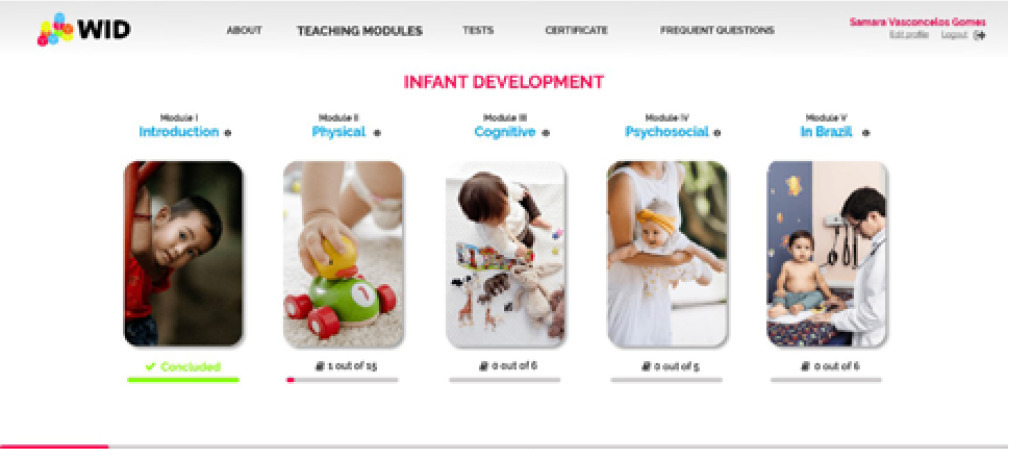
-
12-04-2023
Nursing and the Sustainable Development Goals (SDGs): An Essential Commitment
Revista Brasileira de Enfermagem. 2023;76(6):e760601
Abstract
Nursing and the Sustainable Development Goals (SDGs): An Essential Commitment
Revista Brasileira de Enfermagem. 2023;76(6):e760601
DOI 10.1590/0034-7167.2023760601
Views0The Sustainable Development Goals (SDGs) are a global initiative launched by the United Nations (UN) in September 2015 as part of the 2030 Agenda for Sustainable Development, whose objectives summarize a universal call to action to end poverty, protect the environment and ensure that all people have access to opportunities and well-being, all in an […]See more -
REVIEW04-22-2022
Health needs of mothers of children with Congenital Zika Syndrome: an integrative review
Revista Brasileira de Enfermagem. 2022;75:e20210540
Abstract
REVIEWHealth needs of mothers of children with Congenital Zika Syndrome: an integrative review
Revista Brasileira de Enfermagem. 2022;75:e20210540
DOI 10.1590/0034-7167-2021-0540
Views0See moreABSTRACT
Objectives:
to evidence and analyze the health needs of mothers of children with Congenital Zika Syndrome.
Methods:
a total of 44 articles published between October/2015 and March/2021 on PubMed, LILACS, Scopus, Web of Science and Science Direct were included. The RTI bank and CASP score were applied to classify the methodological quality of the studies. Reflective content analysis and Cecílio and Matsumoto’s taxonomy were used for analysis. Visual map was used as a technique for presenting the results.
Results:
mothers need access to social protection, family-centered, multi-professional empathetic monitoring, cultivating bonds and affection by professionals, sharing of care between health network services, strengthening the social support network and fostering coexistence groups between them.
Final Considerations:
intersectoral initiatives must be implemented for better housing conditions, fighting stigma, holding parents accountable and resuming life project.
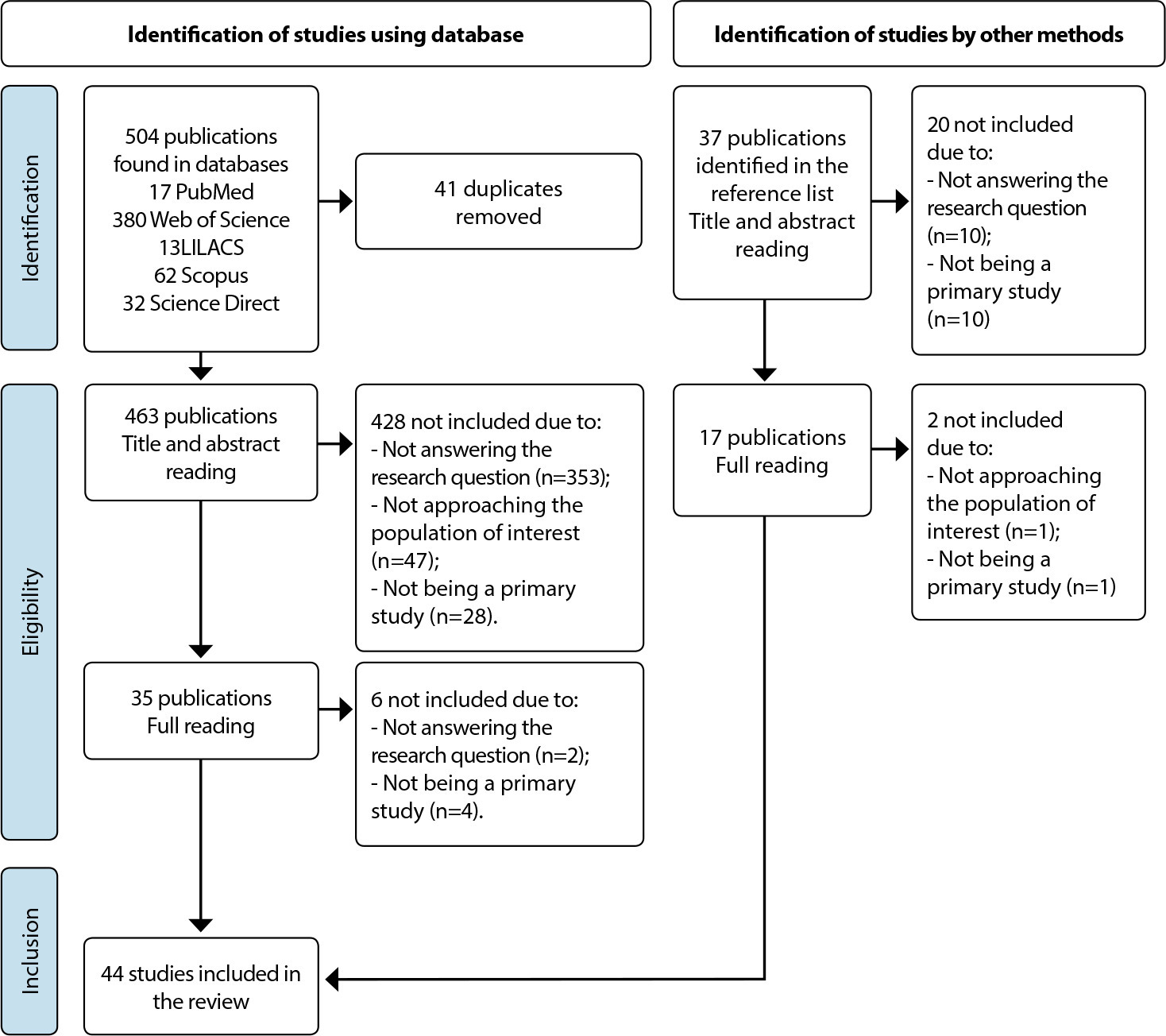
-
REFLECTION12-21-2020
War against the COVID-19 pandemic: reflection in light of Florence Nightingale’s nursing theory
Revista Brasileira de Enfermagem. 2020;73:e20200371
Abstract
REFLECTIONWar against the COVID-19 pandemic: reflection in light of Florence Nightingale’s nursing theory
Revista Brasileira de Enfermagem. 2020;73:e20200371
DOI 10.1590/0034-7167-2020-0371
Views0See moreABSTRACT
Objective:
To reflect on the relationship and importance of the environmental theory regarding practices for promotion, prevention, and treatment of COVID-19.
Methods:
A theoretical-reflexive study about the COVID-19 pandemic in light of the environmental theory proposed by Florence Nightingale.
Results:
It is observed that the application of the theoretical foundations proposed by the environmental theory is related to the current practices used in the fight against the COVID-19 pandemic.
Final Considerations:
It is believed that the theoretical basis is fundamental for the critical-reflexive training of the nursing professional, for the consolidation of Nursing as a science; therefore, it could provide a foundation in nowadays battle against the pandemic.
Search
Search in:
Nuvem de Tags
Adolescente (85) Atenção Primária à Saúde (239) COVID-19 (91) Criança (91) Cuidados de Enfermagem (269) Educação em Enfermagem (151) Educação em Saúde (139) Enfermagem (930) Enfermagem Pediátrica (86) Estudantes de Enfermagem (77) Estudos de Validação (131) Família (87) Idoso (208) Promoção da Saúde (99) Qualidade de Vida (104) Saúde do Trabalhador (86) Saúde Mental (145) Saúde Pública (82) Segurança do Paciente (150) Tecnologia Educacional (100)



